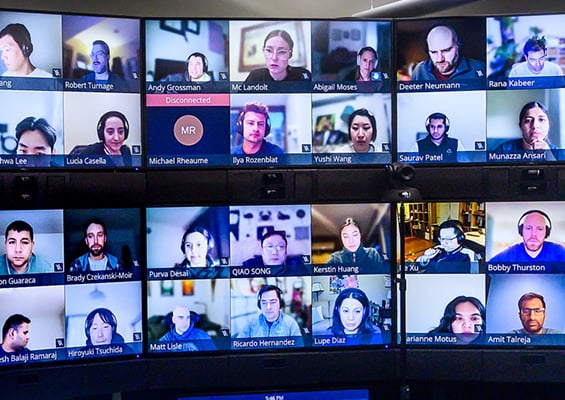While top business schools value a medley of students in their MBA programs, the coursework caters to students who have had full-time work experience. This is because students who have spent time in the workforce have had the opportunity to develop their professional and leadership skills and understand some of the responsibilities, challenges, and accomplishments that accompany a traditional job.
By gaining real-world experience, prospective MBA students gain awareness of key business topics that are critical in the modern workforce and understand how an MBA can help deepen their knowledge on these core topics.
Here’s how your previous work experience can improve your MBA program experience.
Meaningfully contribute to discussions
Enlightened classroom discussions are so crucial to the success of an MBA program, that many admissions offices specifically look for applicants with work experience — among other requirements — to ensure their classrooms include a diverse range of perspectives.
Having professional experience on your resume prepares you to offer informed perspectives during classroom discussions. You’ll understand the material you’re studying better because you can contextualize it within your professional experiences.
When it comes to professional experience, top MBA programs are often comprised of students from backgrounds in the following industries:
- Consulting
- High tech and communications
- Venture capitalism and private equity
- Financial services
- Healthcare and biotech
- Government, education, and nonprofit
- Military
- Energy technology
Representation from each industry — and from different functions within each sector — provides more comprehensive insight, and paves the path to increased business understanding as you and your classmates progress down your MBA path.
Understand modern business needs
Technology changes quickly. So quickly, in fact, that even within the last decade courses from your undergrad program could be nearly unrecognizable compared to courses being taught today. Your on-the-job experiences might be your sole source of knowledge for current business operational needs. And, even if that is not the most comprehensive source of truth, it’s a great starting point.
Have you experienced enough real-world business complexities to understand what skillsets you’re lacking?
Let’s say you’re a product manager. Consider how your organization brings products and services to market:
- Does the process look different today than it did when you first started?
- Does your company emphasize the importance of design-thinking?
- Do you feel heard by upper management when you propose a change in the process?
If you answered ‘no’ to any of those questions — and that doesn’t sit well with you — you’ve learned enough to know that:
- Best practices should always be evolving
- Design-thinking is currently the best practice for defining your product roadmap and pushing you toward your solution
- You may lack the skills to promote your ideas in the workplace
By shifting your focus to modern core business competencies, and practicing the hard and soft skills that help you succeed professionally, you’re preparing yourself to become more marketable in the workforce.
Realign your professional goals with personal preference
Just as modern processes change, so do market disruptions, job functions, and your personal preferences.
Think of blockchain, for instance. Since its invention in 2008, it has moved from the initial bitcoin transfer to governments like Switzerland accepting the currency for tax payments.
As blockchain technology evolves, new careers have popped up along the way:
- Blockchain developers
- Crypto-currency traders
- Blockchain digital architects for decentralized exchange
- Crypto-currency protocol engineers
These careers are available at both start-up level companies and in leading organizations like Visa, IBM, Facebook, and General Electric.
Your previous work experience has given you the foresight to know change happens quickly, and which market disruptions you want to follow. By combining your past work experiences with deepened business knowledge, you become more agile and able to reset your career trajectory.
Build from a foundational network
If you go for a full-time MBA, you may leave your current career to make way for the new opportunity. Before heading out the doors for the last time, don’t forget to take a good look at the colleagues you’re leaving.
Your current professional connections may cross your path again when you least expect it. Even though MBA programs are notorious for improving your network, it’s wise to stay close with the contacts you’ve already made.
In fact, with your added educational experience, contacts from your previous company might lead to viable options for career advancement in the future. Who knows, maybe you’ll even run into former colleagues during an alumni event.
Your professional experience helps you succeed in an MBA program
Having professional experience gives you time to reflect on what you excel at in the workplace, what areas need improvement, what functions interest you, and the types of networks you want to create. These are all valuable business lessons.
Don’t neglect your previous knowledge upon entering an MBA program, instead draw from it to catapult you into the professional you want to be.
Learn how Berkeley can help you advance professionally.








